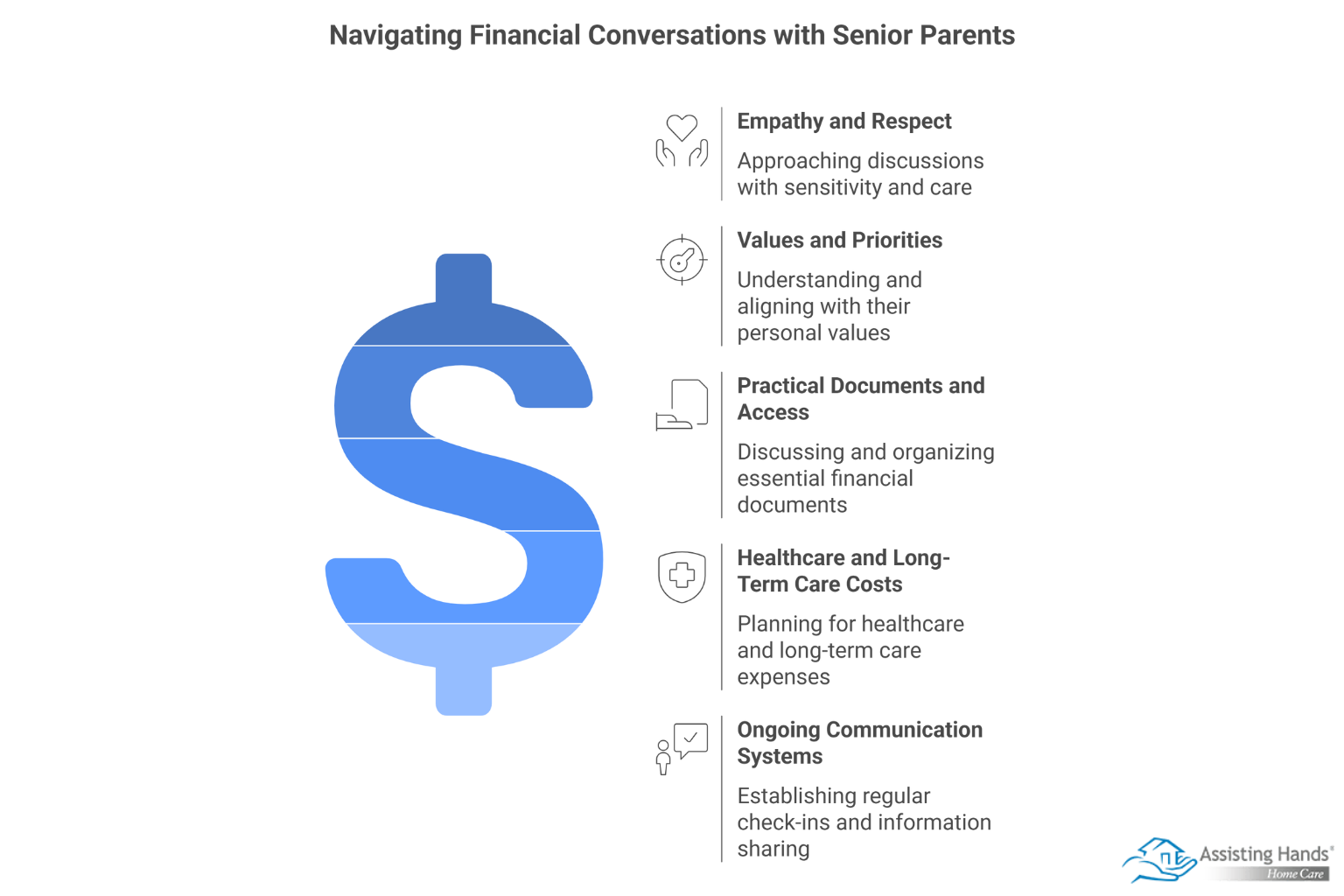
Table of Content
Talking about money with aging parents can feel uncomfortable, but these conversations become essential as they enter their later years. Having open discussions about financial planning ensures their wishes are respected and their needs are met while reducing stress for the entire family.
Start with Empathy and Respect
Approaching financial conversations requires sensitivity to your parents’ feelings about independence and control. Many older adults worry that discussing finances signals a loss of autonomy or suggests their children don’t trust their judgment.
Begin by expressing your care and concern rather than jumping into specific financial details. You might say “I want to make sure we understand your wishes so we can support you the way you’d want.” This framing emphasizes respect for their preferences rather than taking over their decisions.
Choose a relaxed, private setting for these discussions. Avoid bringing up money matters during stressful times or family gatherings where your parents might feel put on the spot. Consider having initial conversations during regular visits when everyone feels comfortable and unhurried.
Acknowledge these conversations might feel awkward at first. Saying something like “This feels a bit uncomfortable to talk about, but I think it’s important” can normalize any tension while showing your commitment to open communication.

Focus on Their Values and Priorities
Rather than leading with practical concerns about accounts and paperwork, start by understanding what matters most to your parents. Ask about their hopes for their remaining years and any specific worries they have about aging or health changes.
Some meaningful questions to explore include:
- What does a comfortable retirement look like to you?
- Are there specific experiences or goals that are important to you?
- What concerns you most about potential health or mobility changes?
- How do you want to handle decisions if you become unable to make them yourself?
- What kind of legacy or support do you want to provide for family members?
Understanding their values helps you frame future financial discussions around their priorities rather than your own concerns. If maintaining independence is crucial to them, focus on financial strategies that support that goal. If family security matters most, discuss how their planning can provide that peace of mind.
Living independently is important for seniors who want to maintain a high quality of life. For some, this simply means receiving help with tasks that have become more challenging to manage over time. Even when families have the best intentions, they may not have the time to provide the care their elderly loved ones need and deserve. If your loved ones need help for a few hours a day or a few days a week, reach out to Assisting Hands Home Care, a trusted provider of respite care Miami seniors can depend on.
Address Practical Documents and Access
Once you’ve established open communication, gradually introduce conversations about essential financial documents. Explain that having access to important information helps you support them more effectively during emergencies or health crises.
Key documents to discuss include:
- Wills and estate planning documents
- Power of attorney for financial and healthcare decisions
- Bank account information and automatic payments
- Insurance policies (health, life, long-term care, property)
- Investment and retirement account details
- Important contact information for financial advisors, attorneys, or accountants
Rather than asking for immediate access to everything, consider starting with emergency contact information and locations of important documents. Some parents feel more comfortable providing this information gradually as trust builds through ongoing conversations.
Discuss their preferences for handling finances if they become temporarily or permanently unable to manage them independently. This includes understanding which family members they’d want involved and what kind of decision-making authority they’d be comfortable delegating.
If your loved ones give you medical power of attorney, you’ll have the authority to hire a home caregiver for them. When researching agencies that provide homecare, families are usually looking for flexible care plans, compassionate and highly trained caregivers, and 24/7 availability. Whether you need respite care to take a break from your caregiving duties or your senior loved ones need around-the-clock assistance at home, you can rely on Assisting Hands Home Care.
Plan for Healthcare and Long-Term Care Costs
Healthcare expenses often represent the largest financial concern for aging adults. Discuss their current health insurance coverage and whether they understand their benefits, particularly regarding Medicare options and supplemental insurance.
Address long-term care planning honestly but sensitively. Many older adults haven’t considered the potential costs of assisted living, home healthcare, or nursing care. Research average costs in your area so you can have informed discussions about how these expenses might fit into their overall financial picture.
Explore their preferences for receiving care if needed. Some parents strongly prefer aging in place, while others might be open to assisted living communities. Understanding their preferences helps you plan financially for different scenarios and ensures their money supports their desired lifestyle.
Consider discussing long-term care insurance if they don’t already have coverage, though availability and affordability vary significantly based on age and health status. Even if insurance isn’t an option, planning for potential care costs can prevent financial crises later.
Create Ongoing Communication Systems
Establish regular check-ins about financial matters rather than treating this as a one-time conversation. Monthly or quarterly discussions help you stay informed about changes in their financial situation while giving them ongoing support with money management tasks.
Some families find it helpful to create simple systems for sharing financial information. This might include shared access to certain accounts, regular updates about spending or income changes, or scheduled meetings with their financial advisors or attorneys.
Consider involving professional help when appropriate. Financial planners, elder law attorneys, or accountants who specialize in retirement planning can provide objective guidance while helping facilitate family discussions. Sometimes parents feel more comfortable discussing sensitive financial matters with professionals rather than family members initially.
Document important information as you learn it, including account numbers, passwords, and contact information for financial institutions. Keep this information secure but accessible to appropriate family members who might need it during emergencies.
If your loved ones’ preferences include living at home throughout their later years, it’s a good idea to plan ahead for the possibility they may need help with the activities of daily living. Many seniors prefer aging in place over moving to assisted living facilities. If your senior loved ones need assistance to remain safe and comfortable while living at home, reach out to Assisting Hands Home Care, a leading Miami home care agency. Our dedicated in-home caregivers can assist with meal prep, bathing and grooming, exercise, medication reminders, and many other important tasks. To create a comprehensive in-home care plan for your loved ones, call us today.
